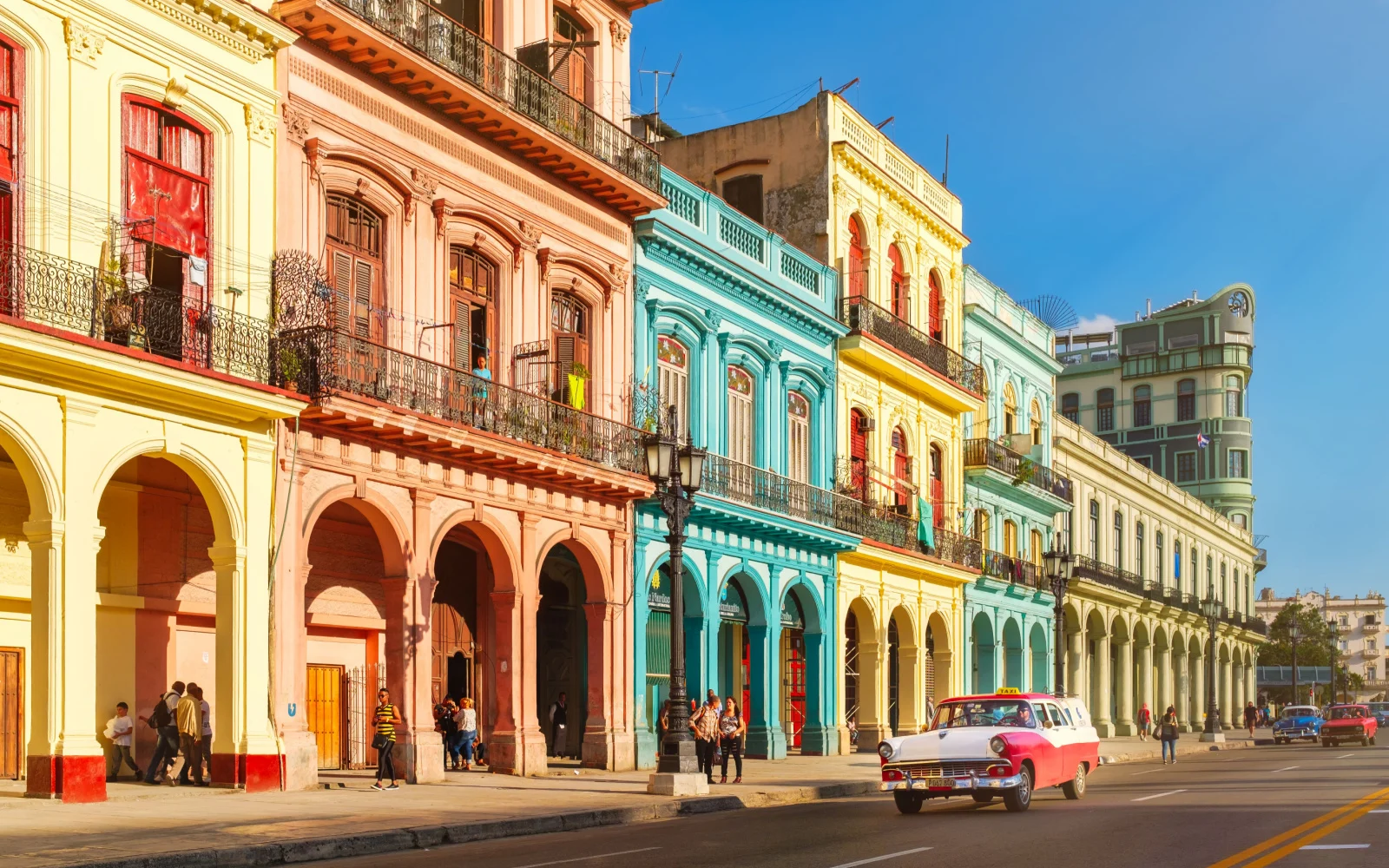Is Cuba safe to visit in 2025?
Cuba is generally safe for tourists, but it’s essential to be aware of common issues like pickpocketing and currency scams. While some neighborhoods in Havana can pose safety risks, many areas are safe to visit. LGBTQ+ travelers may face challenges, but progress has been made in LGBTQ+ rights and accommodations.
If you are planning a trip to Cuba, you might begin by asking yourself if it is safe. Keep in mind that Cuba can be a perfect destination for tourists and periodic travelers to visit. It is a charming and culture-rich country located in the Caribbean.
When you step off the plane, you’ll instantly notice the captivating-colored buildings, fantastic architecture, vintage cars, and you’ll enjoy the vast Cuban culture. If you love salsa dancing and music, you are definitely in the right place.
However, the state shares many safety threats with other developing nations globally. For instance, petty crimes such as pickpocketing, money scams, and theft significantly threaten Cuba’s suitability for tourists.
While there are other reasons for the country’s dangers, it is a safe state, and we’ll provide you with essential tips to ensure you remain safe and happy while visiting. Read on to learn all you need to know!
Is Cuba Safe to Visit?
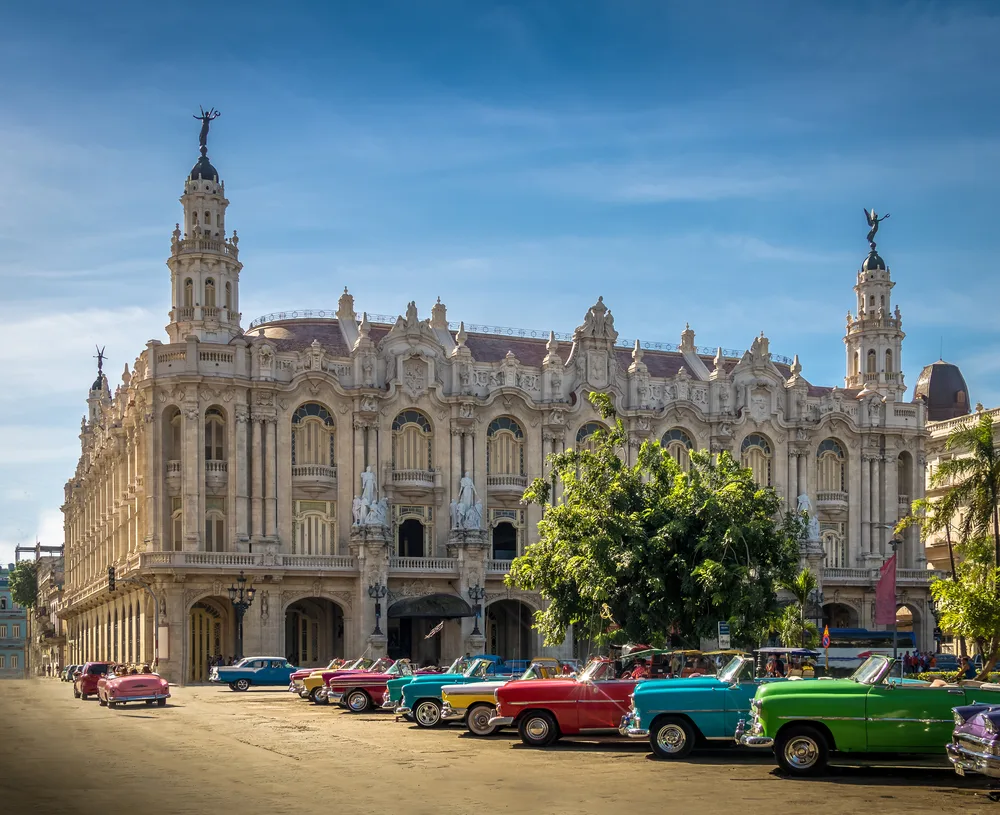
Diego Grandi/Shutterstock
Cuba is generally a safe country to visit. However, like many other developing nations, it is exposed to specific safety risks and health issues.
For instance, pickpocketing and currency scams are common issues affecting many tourists. Other safety risks include water-borne and mosquito-borne diseases, increased rates of road accidents due to the nation’s crumbling infrastructure, tsunamis, and hurricane seasons.
Fortunately, Cuba has become one of the most popular Caribbean destinations for domestic tourists since the pandemic ensued. One notable thing about Cuba is the country is vastly rich in culture.
The Republic of Cuba has an exciting colonial history, sighting Christopher Columbus’s arrival in the late 1400s. It also has breathtaking beaches, and its capital, Havana, is a linchpin of the country’s economy.
A fantastic city where the safety of both tourists and its inhabitants is of the most significant importance. Not to mention, Cuba’s nightlife and music will take your breath away.
If you want to have some fun, consider visiting El Floridita Bar and La Bodeguita del Medio, some of the country’s favorite clubs where you can drink, eat and dance till dawn.
So, regardless of your traveling goals, be careful in the streets. There is a higher chance that you will forever remember Cuba as a beautiful destination.
Crime in Cuba
11.3 million people live in Cuba, and most of the population reside in Havana, Santiago de Cuba, Camaguey, Holguin, and other large towns comprising different social classes.
These and more cities and towns are some of the safest places to reside or visit in the country. Studies show that the crime rate in Cuba had a 7.68% decline from 2015. However, that doesn’t mean that crime is non-existent.
Most of the crimes committed in Cuba are theft related and non-violent. For instance, pickpocketing and bag snatching tend to occur in crowded areas such as the Prado neighborhood and Old Town Havana.
Not to mention, thieves often target tourists carrying valuable jewelry, accessories, and bags. Electronic items such as mobile phones, tablets, and laptops are prone to theft from hotel rooms if left unattended.
It is essential to keep your valuable items under lock and key and keep photocopies of your documents and identification cards in case of theft while in Cuba. Also, avoid wandering alone at night without company.
Other crimes include selling counterfeit products, e.g., cigars. According to the Washington Post, Cuban cigars are unique because they taste like tobacco only grown in Cuba.
Since locals knows how much their cigars are revered, some often pose as innocent retailers and like to hustle travelers and tourists by selling them counterfeit cigars without their knowledge.
Another major crime in Cuba is the existence of drug trafficking. The country is mainly a market for cocaine and cannabis, with demands existing beyond its borders. It serves as a transit point for illicit narcotics trafficked throughout the country.
Thus, tourists need to be careful not to get involved with drug issues because penalties for drug possession, use, and smuggling in Cuba range from hefty fines to lengthy jail sentences.
Some violent crimes, such as robbery with violence or sexual assault, also occur in Cuba. Thus, as a tourist, you must be aware of your surroundings and not physically resist a robbery; staying alive is better.
Avoiding Bad Neighborhoods
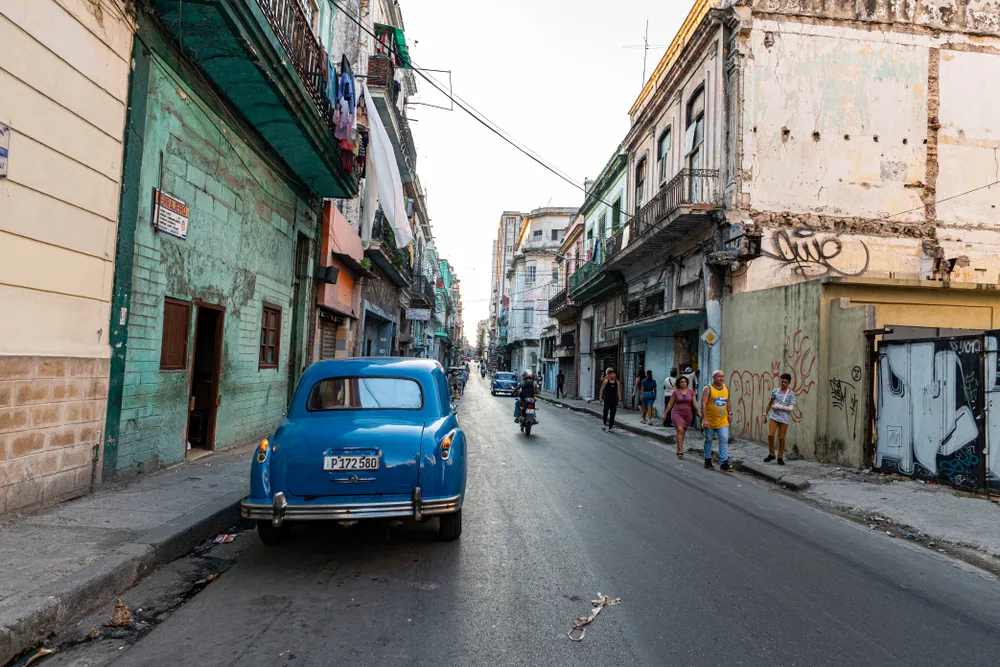
November 27, 2019, Havana, Cuba: vintage american car in Havana City/Diy13/Shutterstock
Cuba may be regarded as one of the safest countries to visit in South America, but unfortunately, not all places are safe. Havana, the capital city, is an excellent and safe city, but contrary to many people’s beliefs, some neighborhoods in Havana pose a safety risk.
When visiting Guanabacoa, Centro Habana, and Marianao, be very careful because the areas are prone to safety issues, including theft. Better yet, as a tourist, avoid visiting these towns.
Safest Places to Visit in Cuba
If you plan to visit Cuba, it is best to research the area to avoid ending up in sketchy places and ruining your trip.
Here are some of the safest places to visit while in Cuba:
Santa Clara
Situated in the center of Cuba, Santa Clara is a revolutionary city and home to over 200,000 inhabitants in Cuba. The city is known as the last site of the Cuban revolution, making it a site for vast historical and political information.
It is an ideal place for history lovers. Most travelers love to tour Santa Clara or its architectural buildings, eclectic community, and bustling Spanish culture.
Guantanamo
Guantanamo, situated in the Southeast of Cuba, is revered for its sugar, cotton wool, and agricultural cane production. It is regarded as a safe city as high-security measures are in place, such as the Guantanamo Bay detention camp for incarcerating criminals.
That said, the city has zero tolerance for crimes, allowing inhabitants to live strictly by the Cuban rules and preventing any detention camp time.
Is Cuba Safe for LGBTQ+ Travelers?
In the past, the Cuban government did not take kindly to homosexuality. Former President Fidel Castro’s government never recognized same-sex relationships and unions, which has not changed.
Since the 1960s, homosexuals have been treated harshly. Most were sent to labor camps and were ostracized in the community.
However, the good news is after the legalization of homosexuality in 1979, LGBTQ+ individuals were free to live as their authentic selves. Unfortunately, they still face harassment to date.
So, if you are wondering whether Cuba is safe for LGBTQ+ travelers, the answer is no. However, today, LGBTQ+ visitors will likely face fewer challenges regarding their identity and sexuality.
Why? Because in 2008, Mariela Castro Espin, an LGBQ+ rights activist, spearheaded and advocated for LGBTQ+ rights, such as sex reassignment surgery, allowing its members the freedom to live by their truths.
Although the government stopped the pride parades in 2019, it authorized the building and opening of the Gran Mathu Rainbow Hotel, a five-star gay hotel for LGBTQ+ members and regular tourists to stay in Cuba.
That shows progress in the LGBTQ+ agenda, allowing queer people to feel safe while traveling to Cuba.
Is Cuba Safe for Female Travelers?
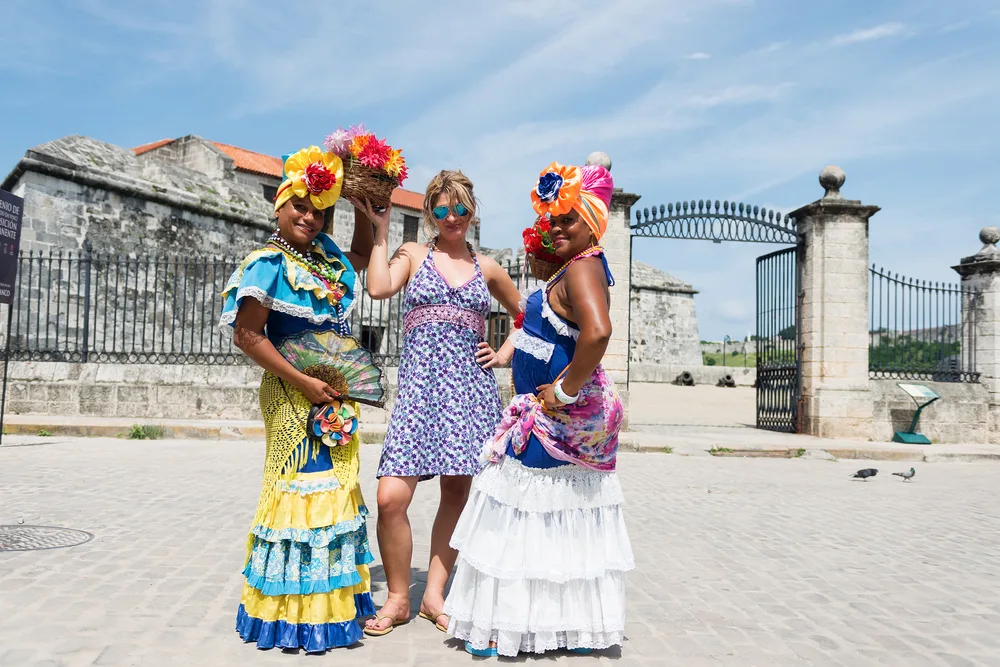
Avatar_023/Shutterstock
Cuba can be safe for women travelers, especially if they exercise simple safety precautions.
These include:
- Not leaving valuables such as jewelry and other accessories unattended.
- Avoiding street hustlers known for catcalling and scamming solo women.
Remember, as a woman in a foreign country, you may be vulnerable to verbal harassment. While it can be offensive, it is harmless. Do yourself a favor and ignore provocations to prevent any physical altercations.
Transportation in Cuba
Although Cuba does not have heavy traffic or winter seasons, driving can be challenging due to the poor roads and the lack of traffic signals in the cities and towns.
Note that Cuba has unlicensed cabs without meters, so it is appropriate if you pre-arrange rides with reliable cab companies where you are assured of safety and can spend less money on the rides.
You can always opt for public transit if your budget is insufficient to cover private transportation. Consider bus travel to connect to most of your destinations. They are reliable and more affordable than rental vehicles.
However, hiring a Cuban-descent travel guide and carrying a map when maneuvering through the cities and towns is essential.
Frequently Asked Questions
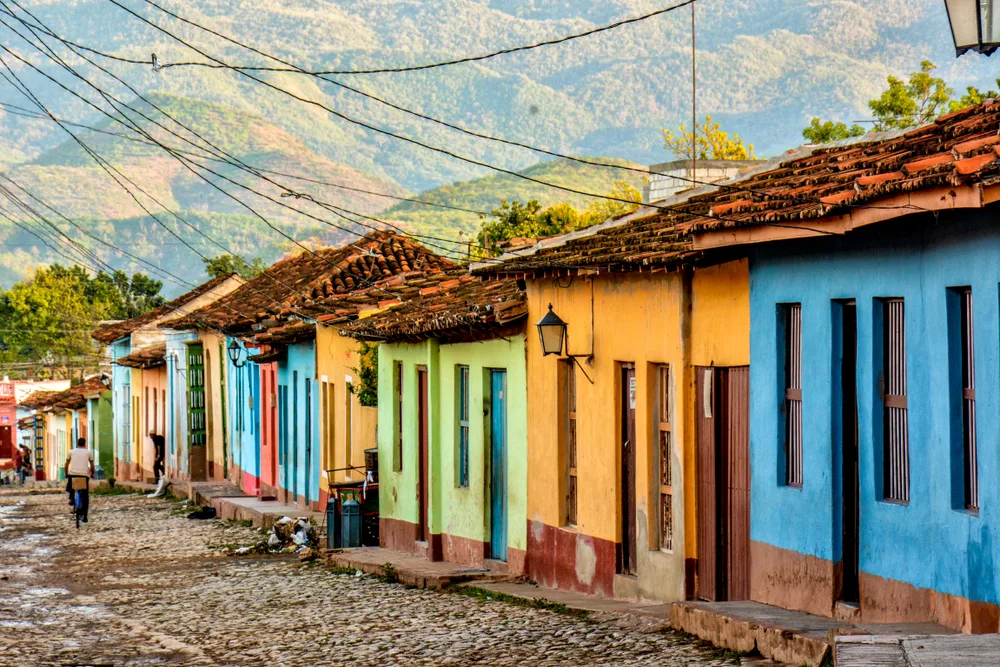
Lukasz Nycz/Shutterstock
Here are frequently asked questions about traveling to Cuba:
What should you do in case of an emergency while in Cuba?
Emergencies can range from getting into car accidents, stomach upsets, or getting robbed in the streets. However, regardless of the type of accident you face while in Cuba, consider contacting the police, fire, or Emergency Medical Services through their emergency contact number 106.
This contact information is readily available on the internet. Remember, as a visitor, you must have the contact numbers of your nation’s embassy when traveling to Cuba for safety purposes.
Is crime a significant issue in Cuba?
While Cuba is regarded as one of the safest Caribbean countries, there is no doubt that there are safety issues. Most of Cuba’s crimes target tourists who fall victim to petty crimes such as pickpocketing, theft, and scams.
It is crucial to stay alert, avoid shady individuals, and leave your valuable items in a safe in your hotel room while in town. Ensure that you remain safe and in the company of acquaintances, tour guides, or loved ones to avoid becoming a target.
Is it safe to swim in the ocean in Cuba?
Cuba has beautiful beaches, including Cayo Coco and Cayo Guillermo. However, tourists should be aware of the best places to swim. It is important to remember that since Cuba is in the Caribbean, there is a likely chance that the ocean comprises deadly sharks.
So, swimming in the deep sea without a lifeguard is inadvisable. Also, it would help if you looked out for jellyfish while in the water.
What are some of the safest places to visit in Cuba?
Some of Cuba’s safest places to visit include Havana, Camaguey, Santiago de Cuba, Holguin, and Guantanamo, with a high cost of living and low crime rates. These areas also offer a vibrant culture you can enjoy while in Cuba.
Are Cuba’s road conditions bad?
Cuba has a bad reputation when it comes to its road standards. Inadequate lighting, potholes, and irregular road maintenance have resulted in road accidents being one of Cuba’s leading causes of death.
Cubans and tourists should drive carefully, especially during the night or during poor weather conditions. It is best to have a map when traveling around Cuba.
So, Is Cuba Safe to Visit?
Cuba is generally a safe place to visit, with prominent policing and strict laws. Although local criminals target foreigners and travelers, we don’t think this is a major reason to be afraid.
However, like any big city, be sure to follow the tips above to ensure your safety. And, most importantly adhere to Cuban laws and rules to be in the best position to avoid any trouble. So what are you waiting for — book your trip today!



